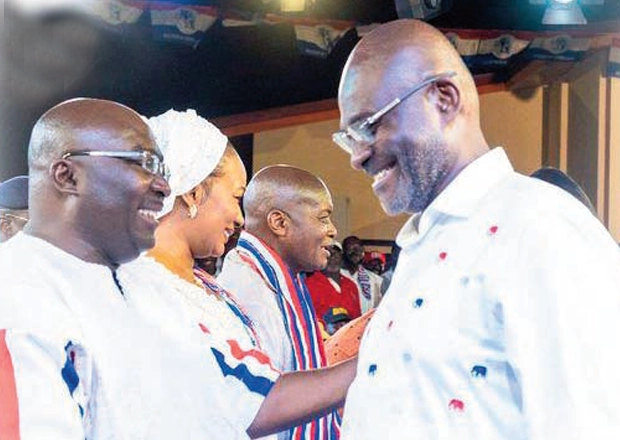In the aftermath of Ghana’s 2024 elections, a new Africa Policy Lens post-election survey indicates Dr. Mahamudu Bawumia is a favourite to lead the New Patriotic Party (NPP) into 2028.
The data shows Bawumia far ahead in a hypothetical party primary. Notably, 70.6% of self-identified NPP supporters among the respondents say they would back Bawumia as the next flag bearer.
This overwhelming endorsement from the party faithful highlights how firmly Bawumia has secured the loyalty of the core NPP membership
Perhaps more strikingly, the survey reveals a strategic cross-party dynamic: nearly half (48.4%) of NDC-aligned respondents say they would support Agyapong in the same NPP contest. In other words, many opposition voters appear to favor Agyapong — likely seeing him as an easier opponent — as the NPP candidate.
This tactical pattern shows how partisan loyalties influence perceptions of the race. Together, these figures underscore the complex dynamics at play: NPP loyalists are coalescing around Bawumia while a substantial share of opposition voters back his intra-party rival, reshaping expectations for the 2028 campaign.
These cross-party preferences add a layer of strategy to the race — the NDC base appears to be hedging by boosting Agyapong’s numbers.
Survey respondents cited several compelling reasons for Dr. Bawumia’s commanding victory in the NPP primaries. Foremost, he is widely perceived as the party’s most viable candidate to recapture power in 2028.
His Northern background is seen as a strategic electoral asset, enabling the NPP to compete strongly in regions where the NDC is not traditionally dominant and also to further boost the NPP as truly a national, non-discriminatory party.
Bawumia’s broad national appeal—evident in his lead across 12 of 16 regions—reinforces his image as a unifying figure with cross-regional support. Respondents also emphasized his experience as Vice President and continuity of the party’s digitalization and economic policies as key strengths.
Moreover, unlike his main rival Kennedy Agyapong, whose support base included many opposition voters, Bawumia’s backing came solidly from within the NPP, giving his candidacy greater legitimacy in the eyes of core party delegates.
Regional support patterns
Bawumia’s dominance extends across most of the country. The survey finds he is the leading candidate in 12 of Ghana’s 16 regions. He tops polling in traditional NPP strongholds like Ashanti and Eastern Region, as well as competitive areas such as Greater Accra, indicating broad appeal. Kennedy Agyapong leads in only three regions — Central, Volta, and Western North — with one region (Ahafo) evenly split.
Notably, Bawumia’s strength is especially pronounced in the northern regions: he would carry the Northern, North East and Upper West, Upper East and Savannah even if only NDC-affiliated voters were surveyed.
This cross-party appeal in the North is a clear advantage. However, he still trails in traditional NDC bastions like Volta and parts of Western North, highlighting areas he will need to focus on to achieve a nationwide victory.
2024 defeat: Major factors
Respondents overwhelmingly blamed the NPP’s defeat on the dire economy. Roughly three-quarters (74.8%) named “general economic conditions (hardships)” – e.g. rampant inflation, cedi depreciation and rising unemployment – as the top reason for the loss.
Many noted that global shocks (the Covid-19 pandemic and Ukraine war) had hurt livelihoods, leading voters to punish the government. By contrast, only small minorities cited other factors (about 5–6% mentioned corruption or abuse of power).
The survey also highlights that public events hurt the NPP’s image: large street protests (over illegal mining, corruption, etc.), organized labour strikes, biased media coverage, and bitter infighting during the primaries were all seen as making the party “very unattractive” before the vote.
In short, the party’s perceived failure to address the cost-of-living crisis – compounded by scandals and internal disunity – emerged as the main cause of the NPP’s 2024 defeat.
Outlook for 2028
Looking ahead, the APL survey conducted in February 2025 positions Bawumia as the early frontrunner in the 2028 presidential race. In a simulated national vote, 35.8% of respondents say they would support Bawumia, far outpacing the 19.8% for the likely NDC candidate, Prof. Naana Jane Opoku-Agyemang.
Kennedy Agyapong trails further at roughly 12%. However, the contest remains highly uncertain: a staggering 69% of respondents said it was too early to decide on the next election just one month into the new administration.
However, Bawumia’s early lead among the 35.8% respondents gives him momentum, but converting that into victory will require energizing the core NPP base and reaching out to floating voters across party lines.
Source: Africa Policy Lens Post-Election Survey (2028)













